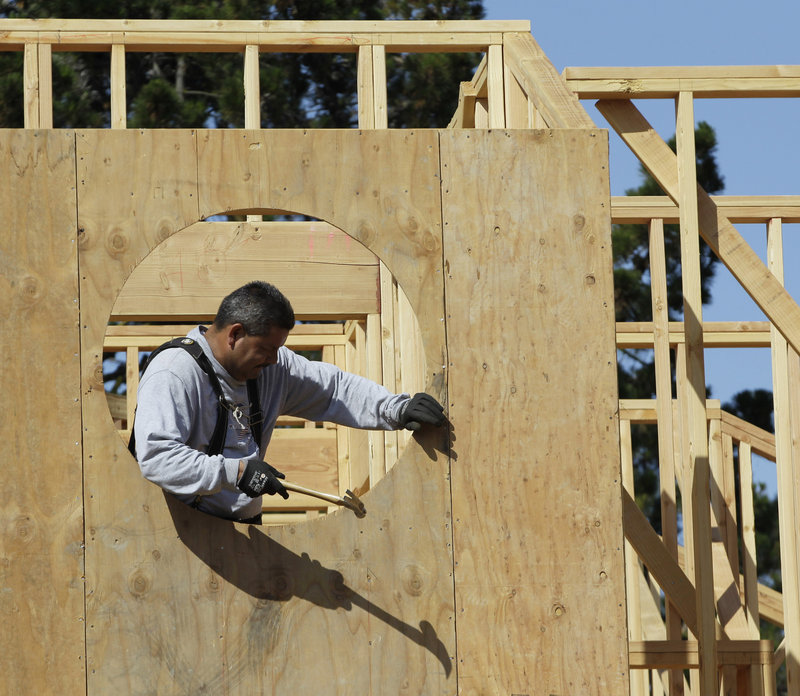WASHINGTON – Home construction is making a long-awaited recovery that could help energize the U.S. economy.
From areas like Phoenix that are finally arising from the housing bust to cities like Chicago and Minneapolis where strong economies have lifted demand, residential construction is healthier than at any time since sales and prices collapsed five years ago.
The improvement has been gradual. But builders are responding to interest from buyers drawn by reduced prices, record-low mortgage rates and rising rents, which have made home purchases comparatively appealing. And the supply of new homes has shrunk to near record lows. That’s pushing developers to build more.
“We’ve been hoping for this for a long time,” said Celia Chen, a housing economist at Moody’s Analytics. “Housing has been flat-lining at the bottom for two years. It looks like things are turning.”
Last month, U.S. builders broke ground on the most homes in nearly four years. Single-family home building — the bulk of the market — rose for a fourth straight month. And permits to build single-family homes reached their highest point since March 2010.
The news helped lift stock prices. The Dow Jones industrial average rose 87 points in afternoon trading. And homebuilders’ stocks gained. KB Home and Hovnanian Enterprises both gained nearly 1 percent.
Home construction still has a long way to go to fully regain its health. June’s seasonally adjusted annual rate of 760,000 is the highest since October 2008. But it’s only about half the 1.5 million annual pace that economists consider normal.
From the depth of the housing bust in April 2009, when the seasonally adjusted annual rate bottomed at 478,000 homes, the improvement has been slow but steady.
Building increased in early 2010 as the government’s tax credits for home buyers lifted sales. Beginning that summer, the pace essentially stalled until late 2011, when it began rising gradually.
A continued resurgence would deliver big economic benefits: A healthy pace of 1.5 million new homes a year would lower the unemployment rate by about 1.5 percentage points and create 50,000 additional jobs a month, according to calculations by Joel Prakken, chairman of Macroeconomic Advisers. About half the jobs would be construction workers and contractors
It would also add roughly 0.5 percentage point to annual economic growth, Prakken estimates.
Economists at IHS Global Insight, a consulting firm, caution that they don’t foresee starts reaching 1.5 million a year until 2015. At the current lower levels, home construction will likely have only a modest effect on the economy.
New homes represent just 20 percent of the home market. But each home built creates an average of three jobs for a year and generates about $90,000 in taxes, according to data from the home builders association.
The pace of construction, and requests for permits, have picked up in many of the largest U.S. cities in the past year. Some of those gains reflect bounce-backs by areas devastated by the housing bust.
For example, permits for new homes jumped 85 percent in Phoenix in the 12 months that ended in May, according to an estimate by Moody’s Analytics. May is the latest month for which figures are available.
Permits are 76 percent higher in Miami than a year ago, Moody’s estimates. Nationwide, they’ve risen 27 percent.
Even cities that largely escaped the housing bust are faring well. Permits have jumped 88 percent in Chicago, 53 percent in Minneapolis and 26 percent in San Diego.
In many cities that endured a boom and bust, developers are building in unfinished subdivisions, said Mark Vitner, an economist at Wells Fargo Securities. Land there is generally cheap. And builders can sell at prices low enough to compete with foreclosures.
Foreclosed homes, in turn, have become less attractive, Vitner noted. Most of the better properties have already been bought, many by investors. The ones left over are usually undesirable because they’re far from city centers or in poor condition.
“It’s like going to an after-Christmas sale after New Year’s,” Vitner said. “The best stuff is long gone.”
Send questions/comments to the editors.



Success. Please wait for the page to reload. If the page does not reload within 5 seconds, please refresh the page.
Enter your email and password to access comments.
Hi, to comment on stories you must . This profile is in addition to your subscription and website login.
Already have a commenting profile? .
Invalid username/password.
Please check your email to confirm and complete your registration.
Only subscribers are eligible to post comments. Please subscribe or login first for digital access. Here’s why.
Use the form below to reset your password. When you've submitted your account email, we will send an email with a reset code.